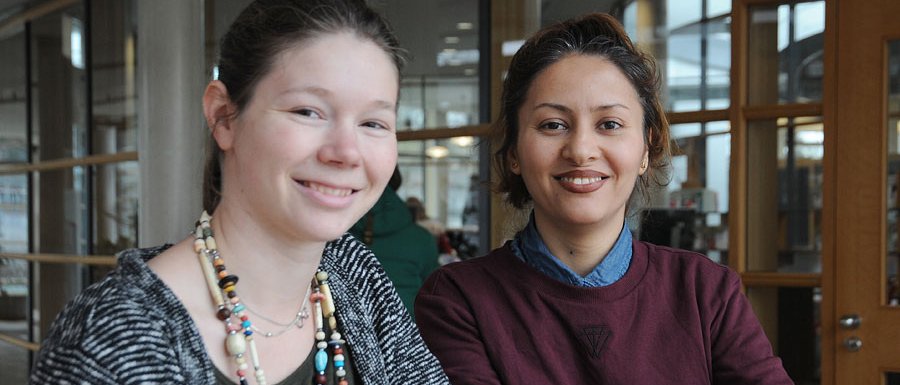Buddies for Refugees:
Dipping a toe in the water at TUM

Maria, what is “Buddies for Refugees” about?
Weinberger: Since last year, refugees who are interested in studying are able to attend lectures in various subjects – as guest lecturers, free of charge – as a possibility to get a bit of insight into the German university system. The “Buddy”-program aims to provide them with mentors who can help them individually and on a personal level.
How did you become a Buddy?
Weinberger: The Junge Akademie is looking for TUM students and alumni who would be interested in becoming a Refugee-Buddy, for the period of one semester to start off with. I received an email with which the Junge Akademie was recruiting potential Buddies, and I was really interested in the program – so I applied. At the kick-off event, where the participants got to know each other, I met Neda, my tandem partner.
Neda, you are a guest student in the field of Biology in Freising. How come you are now at TUM?
Iskandari: I was born in Iran, where my whole family lives. As my father is from Afghanistan, I only have an Afghan passport. I studied Psychology in Iran, but my residence permit expired after I finished my course of studies. I would have had to go to Afghanistan, but the war was going on – so I fled to Germany. Now, I’m living in a refugee camp in Munich. I applied for the guest program because I would like to study in Germany.
What do you do as a tandem?
Iskandari: We meet about once a month – the first time at an introductory event, then privately. Maria showed me Freising, and we baked cookies together before Christmas.
The tandem semester will soon be over. What do you think of Buddy-program?
Weinberger: I think the program is very good. For the refugees, it’s an opportunity to get to know TUM and to get an impression of studying in Germany. For me, the Buddy-program was a very enriching experience as well, as I could broaden my cultural horizon. Together, we looked at photos from Neda’s home country and talked about holidays and celebrations, about what customs for good luck there are in our countries.
Iskandari: Maria helped me a lot, and I’m glad to have her as a Buddy. For example, she showed me how to manage my e-mails correctly, and she helped me to be able to attend a language course at TUM. There, I found many new friends from outside the refugee camp who are exchange students at TUM.
Neda, what are your plans for the future?
Iskandari: I got a residence permit in January, so I can stay in Germany. It is my dream to study Biology at TUM as an enrolled student. And even if the Buddy-program is only for one semester, I would like to stay in personal contact with Maria.
(Interview: Sabrina Czechofsky)
Maria Weinberger, 24, studied Pharmaceutical Bioprocess Technology in Freising and started her doctoral studies at the Chair for Food and Bioprocess Engineering last summer. She lives in Freising and plays the clarinet at the Blasmusik Weihenstephan.
Neda Iskandari, 26, is from Iran, where she studied Psychology for four years. 14 months ago, she fled to Germany on her own. Her parents and siblings are still living in Iran. Neda often calls her parents, and she uses Whatsapp to chat with her sister almost every day.
- If you would like to volunteer as a Buddy from April 2017 onwards, please apply online. All further information: Mentoring “Buddies for refugees”